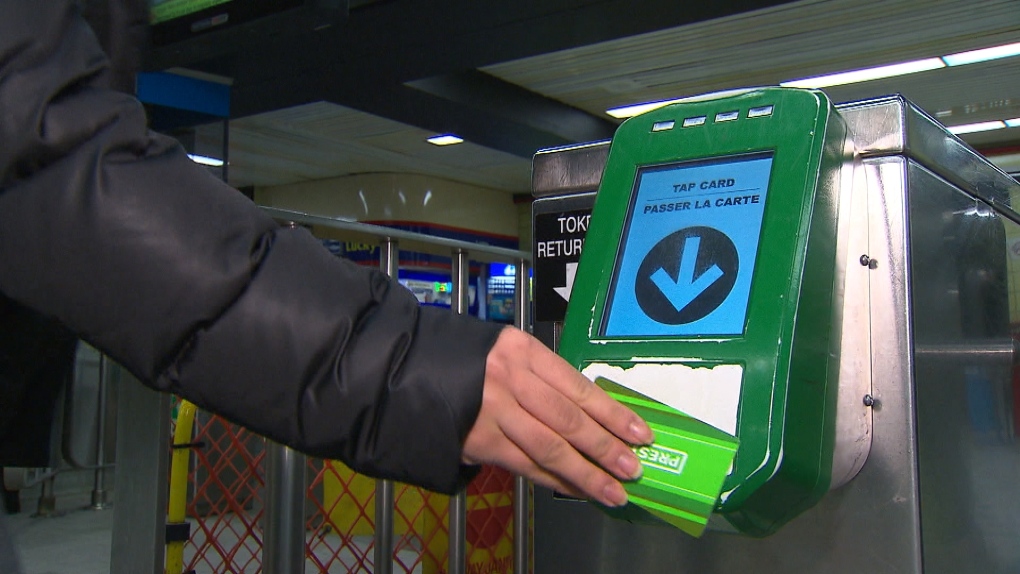
TTC staff recommend scrapping monthly pass, implementing fare capping system
 A woman taps a PRESTO fare card on a reader in a TTC station in an undated image. (CP24)
A woman taps a PRESTO fare card on a reader in a TTC station in an undated image. (CP24)
The TTC may soon be scrapping its monthly pass in favour of a new “fare capping” system that would eliminate the need to buy a pass in advance.
In a new report on the TTC’s five-year fare strategy, staff recommended that the TTC board endorse the new fare capping system “in principle.”
The new system would allow all customers to travel for free after reaching a certain number of trips in a pre-determined period of time rather than purchasing a monthly pass at the beginning of the month, according to the report.
In the report, staff say the benefits of the TTC’s current monthly pass have “diminished” and fare capping will “better address customer needs.”
“Prior to the monthly pass being offered on PRESTO and the implementation of the two-hour transfer, the TTC’s former Metropass was very popular and had a high adoption rate across all customer groups, with 50 (per cent) of customers using Metropasses as of late 2015,” the report read.
“In 2017, Metropass transitioned to PRESTO Monthly Passes and after the implementation of the two-hour transfer in 2018, there was a significant decline in monthly pass users.”
Currently, adult riders would need to take 48 trips per month to reap the benefits of a monthly pass and post-secondary riders would need to take 40 trips before the benefits of the monthly pass are realized.
A monthly pass currently costs $156 for adults and $128.15 for post-secondary students.
“It is more equitable and affordable than the previous fare model because it removes the current burden of requiring customers to pay full price for a pass upfront,” the report read.
“It provides the TTC with the flexibility to phase in fare caps at different levels for different customer groups, while helping to maintain financial sustainability within the organization.”
While staff said the financial impact of a fare cap system would “vary significantly” depending on the parameters, introducing a fare cap at each group’s current “break-even” trip rate would result in an annual revenue loss of about $17 million based on pre-pandemic ridership levels.
As of December, the TTC’s ridership levels were believed to be at about 50 per cent of pre-pandemic levels.
Staff are also recommending that the board approve boosting the discount for seniors and youth to align with the city’s Fair Pass program, which reduces TTC fares for low-income residents.
The estimated revenue loss to align these fares is $7 million based on pre-pandemic ridership levels, staff said.
The report will be presented to the board next week and a final report on the five-year fare policy will be brought to the board for approval in May.
CTVNews.ca Top Stories

BREAKING Pearson gold heist suspect arrested after flying into Toronto from India
Another suspect is in custody in connection with the gold heist at Toronto Pearson International Airport last year, police say.
BREAKING Justin and Hailey Bieber are expecting their first child together
Hailey and Justin Bieber are going to be parents. The couple announced the news on Thursday on Instagram, both sharing a video that showcases Hailey Bieber's growing belly.
From outer space? Sask. farmers baffled after discovering strange wreckage in field
A family of fifth generation farmers from Ituna, Sask. are trying to find answers after discovering several strange objects lying on their land.
Poilievre-led government 'would never' use notwithstanding clause on abortion, his office says
A Conservative government led by Pierre Poilievre would not legislate on, nor use the notwithstanding clause, on abortion, his office says, as anti-abortion protesters gather on Parliament Hill.
Ontario family receives massive hospital bill as part of LTC law, refuses to pay
A southwestern Ontario woman has received an $8,400 bill from a hospital in Windsor, Ont., after she refused to put her mother in a nursing home she hated -- and she says she has no intention of paying it.
Here are the ultraprocessed foods you most need to avoid, according to a 30-year study
Studies have shown that ultraprocessed foods can have a detrimental impact on health. But 30 years of research show they don’t all have the same impact.
Miss Teen USA steps down just days after Miss USA's resignation
Miss Teen USA resigned Wednesday, sending further shock waves through the pageant community just days after Miss USA said she would relinquish her crown.
BREAKING 1 dead in rollover crash in Sharbot Lake, Ont.; 5 others injured
Ontario Provincial Police confirm one person has died after a single-vehicle rollover crash in Sharbot Lake, Ont. that seriously injured five others.
Cyclist strikes child crossing the street to catch school bus in Montreal
A video circulating on social media of a young girl being hit by a bike has some calling for better safety and more caution when designing bike lanes in the city. The video shows a four-year-old girl crossing Jeanne-Mance Street in Montreal's Plateau neighbourhood to get on a school bus stopped on the opposite side of the street

































